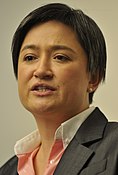Results_of_the_2016_Australian_federal_election_(Senate)
2016 Australian Senate election
Australian federal election results
The 2016 Australian federal election in the Senate was part of a double dissolution election held on Saturday 2 July to elect all 226 members of the 45th Parliament of Australia, after an extended eight-week official campaign period. It was the first double dissolution election since the 1987 election and the first under a new voting system for the Senate that replaced group voting tickets with optional preferential voting.
| |||||||||||||||||||||||||||||||||||||||||||||||||||||||||||||||||||||||||||||||||||||||||||||||||||||||||||||||||||||||||||||||||||||||||||||
All 76 seats in the Australian Senate 39 seats needed for a majority | |||||||||||||||||||||||||||||||||||||||||||||||||||||||||||||||||||||||||||||||||||||||||||||||||||||||||||||||||||||||||||||||||||||||||||||
|---|---|---|---|---|---|---|---|---|---|---|---|---|---|---|---|---|---|---|---|---|---|---|---|---|---|---|---|---|---|---|---|---|---|---|---|---|---|---|---|---|---|---|---|---|---|---|---|---|---|---|---|---|---|---|---|---|---|---|---|---|---|---|---|---|---|---|---|---|---|---|---|---|---|---|---|---|---|---|---|---|---|---|---|---|---|---|---|---|---|---|---|---|---|---|---|---|---|---|---|---|---|---|---|---|---|---|---|---|---|---|---|---|---|---|---|---|---|---|---|---|---|---|---|---|---|---|---|---|---|---|---|---|---|---|---|---|---|---|---|---|---|
| |||||||||||||||||||||||||||||||||||||||||||||||||||||||||||||||||||||||||||||||||||||||||||||||||||||||||||||||||||||||||||||||||||||||||||||
 Government (30) Coalition | |||||||||||||||||||||||||||||||||||||||||||||||||||||||||||||||||||||||||||||||||||||||||||||||||||||||||||||||||||||||||||||||||||||||||||||
| |||||||||||||||||||||||||||||||||||||||||||||||||||||||||||||||||||||||||||||||||||||||||||||||||||||||||||||||||||||||||||||||||||||||||||||
The final outcome in the 76-seat Australian Senate took over four weeks to complete despite significant voting changes. Earlier in 2016, legislation changed the Senate voting system from a full-preference single transferable vote with group voting tickets to an optional-preferential single transferable vote.[1] The final Senate result was announced on 4 August: Liberal/National Coalition 30 seats (−3), Labor 26 seats (+1), Greens 9 seats (−1), One Nation 4 seats (+4) and Nick Xenophon Team 3 seats (+2). Former broadcaster and founder of the Justice Party Derryn Hinch, won a seat, while Jacqui Lambie, Liberal Democrat David Leyonhjelm and Family First's Bob Day retained their seats. The number of crossbenchers increased by two to a record 20. The Liberal/National Coalition will require at least nine additional votes to reach a Senate majority, an increase of three.[2][3][4]
A number of initially-elected senators were declared ineligible a result of the 2017–18 Australian parliamentary eligibility crisis, and replaced after recounts.
The two major parties negotiated to allocate a six-year term to the first elected six of twelve senators in each state, while the last six received a three-year term. This was consistent with the Senate practice on all seven previous occasions.[5] In 1983 the Joint Select Committee on Electoral Reform had unanimously recommended an alternative "recount" method to reflect proportional representation,[6] and the Commonwealth Electoral Act provides for a recount on that basis.[7] This alternative method had been supported by both Labor and the Coalition in two separate, identical, bipartisan senate resolutions, passed in 1998 and 2010.[8][5][9] By not adhering to their previous resolutions, Labor and the Coalition each gained one senate seat from 2019.[10][11][12][13][14][15]
The final Senate result was announced on 4 August. The incumbent Liberal/National Coalition government won 30 seats, a net loss of three − the Coalition lost four Senators, one each from New South Wales, Queensland, Western Australia and South Australia, but gained a Senator in Victoria. The Labor opposition won 26 seats, a gain of one − a Senator in Western Australia. The number of crossbenchers increased by two to a record 20. The Liberal/National Coalition would require at least nine additional votes to reach a Senate majority, an increase of three.[2][3][4][16]
| Party | Votes | % | Swing | Seats won | Change | ||
|---|---|---|---|---|---|---|---|
| Liberal–National Coalition | 4,868,246 | 35.18 | –1.32 | 30 | |||
| Liberal/National joint ticket | 2,769,426 | 20.01 | −1.16 | 10 | |||
| Liberal | 1,066,579 | 7.71 | +0.77 | 14 | |||
| Liberal National | 960,467 | 6.94 | −1.16 | 5 | |||
| Country Liberal | 37,156 | 0.27 | −0.05 | 1 | |||
| National (WA) | 34,618 | 0.25 | −0.06 | 0 | |||
| Labor | 4,123,084 | 29.79 | +0.16 | 26 | |||
| Greens | 1,197,657 | 8.65 | −0.58 | 9 | |||
| One Nation | 593,013 | 4.29 | +3.76 | 4 | |||
| Xenophon Team | 456,369 | 3.30 | +1.37 | 3 | |||
| Liberal Democrats | 298,915 | 2.16 | –1.59 | 1 | |||
| Justice | 266,607 | 1.93 | +1.93 | 1 | |||
| Family First | 191,112 | 1.38 | +0.26 | 1 | |||
| Democratic Labour | 94,510 | 0.68 | –0.18 | 0 | |||
| Lambie Network | 69,074 | 0.50 | +0.50 | 1 | |||
| Motoring Enthusiasts | 53,232 | 0.38 | –0.12 | 0 | |||
| Palmer United | 26,210 | 0.19 | –5.42 | 0 | |||
| Total | 13,838,900 | 76 | |||||
| Invalid/blank votes | 567,806 | 3.94 | +1.01 | ||||
| Registered voters/turnout | 15,671,551 | 91.93 | –1.52 | ||||
| Source: Federal Election 2016 | |||||||
|
| ||||||||||||||||||||||||||||||||||||||||||||||||||||||||||||||||||||||||||||||||||||||||||||||||||||||||||||||||||||||||||||||||||||||||||||||||||||||||||||||||||||||||||||||||||||||||||||||||||||||||||||||||||||||||||||||||||||||||||||||||||||||||||||||||||||||||||||||||||||||||||||||||||||||||||||||||||||||||||||||||||||||||||||||
|
| ||||||||||||||||||||||||||||||||||||||||||||||||||||||||||||||||||||||||||||||||||||||||||||||||||||||||||||||||||||||||||||||||||||||||||||||||||||||||||||||||||||||||||||||||||||||||||||||||||||||||||||||||||||||||||||||||||||||||||||||||||||||||||||||||||||||||||||||||||||||||||||||||||||||||||||||||||||||||||||
|
| ||||||||||||||||||||||||||||||||||||||||||||||||||||||||||||||||||||||||||||||||||||||||||||||||||||||||||||||||||||||||||||||||||||||||||||||||||||||||||||||||||||||||||||||||||||||||||||||||||||||||||||||||||||||||||||||||||||||||||||||||||||||||||||||||||||||||||||||||||||||||||||||||||||||||||||||||||||||||||||
|
| ||||||||||||||||||||||||||||||||||||||||||||||||||||||||||||||||||||||||||||||||||||||||||||||||||||||||||||||||||||||||||||||||||||||||||||||||||||||||||||||||||||||||||||||||||||||||||||||||||||||||||||||||||||||||||||||||||||||||||||||||||||||||||
|
| ||||||||||||||||||||||||||||||||||||||||||||||||||||||||||||||||||||||||||||||||||||||||||||||||||||||||||||||||||||||||||||||||||||||||||||||||||||||||||||||||||||||||||||||||||||||||||||||||||||||||||||||||||||||||||||||||||
|
| ||||||||||||||||||||||||||||||||||||||||||||||||||||||||||||||||||||||||||||||||||||||||||||||||||||||||||||||||||||||||||||||||||||||||||||||||||||||||||||||||||||||||||||||||||||||||||||||||||||||||||||||||||||||
Australian Capital Territory
|
| ||||||||||||||||||||||||||||||||||||||||||||||||||||||||||||||||||||||||||||||||||||||||||||||||||||||||||||
Northern Territory
|
| ||||||||||||||||||||||||||||||||||||||||||||||||||||||||||||||||||||||||||||||||||||||||||
- Brandis was the Leader of the Government in the Senate, whereas the leader of the Coalition in the Australian House of Representatives was Prime Minister Malcolm Turnbull.
- Wong was the Leader of the Opposition in the Senate, whereas the leader of the Labor Party in the Australian House of Representatives was Opposition Leader Bill Shorten.
- Nash was declared to be ineligible by the Court of Disputed Returns because she was a dual citizen of the United Kingdom.[18] A special recount resulted in Jim Molan being declared to have been elected.
- Roberts was declared to be ineligible by the Court of Disputed Returns because he was a dual citizen of the United Kingdom.[18] A special recount determined that Fraser Anning was elected instead.
- Waters resigned on 18 July 2017 because she was a dual citizen of Canada. The Court of Disputed Returns declared she was ineligible to be elected.[18] A special recount declared Andrew Bartlett had been elected instead.
- Ludlam resigned on 14 July 2017 because he was a dual citizen of New Zealand. The Court of Disputed Returns declared he was ineligible to be elected.[18] A special recount led to Steele-John being declared to have been elected instead.
- Culleton was found ineligible by the Court of Disputed Returns.[19] A special recount led to Georgiou being declared to have been elected on 10 March 2017.[20]
- Kakoschke-Moore resigned on 22 November 2017 after learning she was a British citizen by descent. The Court of Disputed Returns declared she had been ineligible to be elected on 13 February 2018.[21] A special recount determined that Tim Storer was elected instead.
- Day was found ineligible by the Court of Disputed Returns.[22] A special recount led to Gichuhi being declared to have been elected on 19 April 2017.[23]
- In 2016, Lisa Singh was demoted to sixth position on the Labor Party's Tasmanian Senate ticket behind Senator Catryna Bilyk and union secretary John Short.[24] A quota in Tasmania was 26,090 votes with Singh receiving 20,741 below-the-line votes: enough to overturn the party’s ticket order. She was the 10th senator elected for Tasmania, ahead of Catryna Bilyk (elected 11th), with John Short missing out.[25]
- Parry resigned on 1 November 2017 because he was a dual citizen of the United Kingdom.[26] A special recount determined that Colbeck was elected instead.
- Lambie resigned on 14 November 2017 because she was a dual citizen of the United Kingdom. The Court of Disputed Returns declared she had been ineligible to be elected on 9 February 2018. A special recount determined that Martin was elected instead.
- Nicole Hasham (3 July 2016). "Election 2016 results: Senate count throws up a wild mix as One Nation, Fred Nile, Liberal Democrats vie for seats". news.com.au. Retrieved 3 July 2016.
- "Federal Election 2016: Senate Results". Australia Votes. Australian Broadcasting Corporation. 3 July 2016. Retrieved 4 July 2016.
- "Senate photo finishes". Blogs.crikey.com.au. 12 July 2016. Retrieved 30 July 2016.
- "Division of the Senate following simultaneous general elections". Odgers' Australian Senate Practice (14th ed.). Parliament of Australia. Retrieved 28 March 2017.
- Joint Select Committee on Electoral Reform (13 September 1983). "First report - electoral reform" (PDF). Parliament of Australia. pp. 66–7.
- Green, A (25 April 2016). "How long and short terms are allocated after a double dissolution". ABC.net.au.
- "Election 2016: Pauline Hanson secures six-year Senate term, Derryn Hinch has three years until re-election". ABC News. 12 August 2016. Retrieved 16 April 2019.
- "Coalition flags first elected Senate plan: Sky News 12 August 2016". Archived from the original on 13 August 2016. Retrieved 12 August 2016.
- "2016 Federal Election: First preferences by Senate group". Australian Electoral Commission. 9 August 2016. Retrieved 10 June 2022.
- Barber, Stephen (7 April 2017). "Federal Election 2016" (PDF). Research Paper 2016–17. Parliamentary Library. ISSN 2203-5249.
- Re Canavan [2017] HCA 45 (27 October 2017) "Judgment summary" (PDF). High Court. 27 October 2017.
- Re Culleton (No 2) [2017] HCA 4. "Judgment summary" (PDF). High Court. 3 February 2017.
- "Senator Peter Georgiou". Parliament of Australia. Retrieved 5 April 2017.
- Byrne, Elizabeth; Doran, Matthew (13 February 2018). "High Court rules former NXT senator cannot replace herself, Tim Storer likely to win recount". ABC News. Retrieved 16 February 2018.
- Re Day [No 2] [2017] HCA 14, "Judgment summary" (PDF). High Court of Australia.
- "Senator Lucy Gichuhi". Parliament of Australia. Retrieved 5 November 2017.
- "Labor unveils Senate candidates with Lisa Singh relegated to unwinnable spot". ABC News. 12 May 2016. Retrieved 8 July 2016.
- Remeikis, Amy (1 November 2017). "Liberal Stephen Parry to resign over dual British citizenship". The Guardian. Retrieved 1 November 2017.







